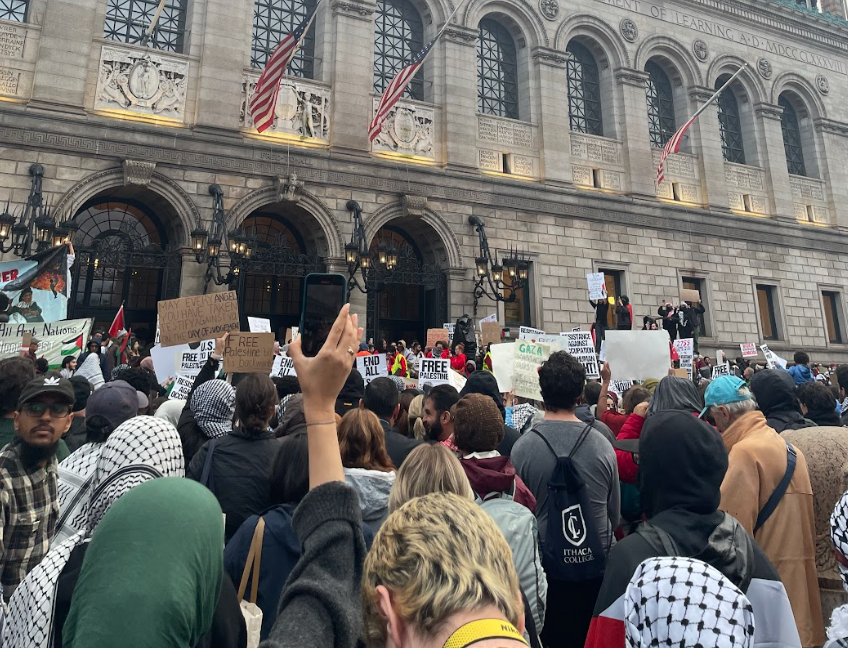Similar to students at most other higher education institutions, Wellesley students sustain a thriving Facebook presence. On class pages, students learn basic information about classes and events. Students buy and sell clothing, knick-knacks, textbooks and more on “Free & for Sale,” a private reselling group. “Wellesley Memes for Grade Deflated Feminist Teens” provides a platform for students to make meta-commentary and share Wellesley-centered inside jokes, while anonymous love abounds on “Wellesley Crushes.”
The aforementioned pages are rarely arenas for controversy. More often, discourse occurs on “Overheard at Wellesley” and “Wellesley Uncensored Confessions,” semi-public platforms where students have the ability to engage anonymously. On “Overheard,” students post funny quips they happen to overhear without the names of the original speakers attached. “Uncensored” provides an outlet for anonymous student contributors to question, complain and rant. It is monitored only “for ignorance, not malice,” as the unnamed moderator stated in a comment.
These pages that allow for a degree of anonymity have incited contentious online debate. “Overheard” is not just a forum for campus-wide inside jokes, but has also been used as a public medium through which students expose, deconstruct and critique instances of explicit racism and transphobia that they overhear, both in casual conversation and in the classroom. The Wellesley News supports users of “Overheard” who use the platform to publicize instances of racism, transphobia and other discriminatory attitudes on campus. The comments on particular “Overheard” threads can be constructive avenues for students to unpack problematic language that may otherwise go unchecked.
“Wellesley Uncensored Confessions” is another matter. “Uncensored” was created in response to an earlier, more-moderated confessions group, which was deactivated by its administrators because of the inordinate amount of negativity on the page. The Editorial Board of the Wellesley News recognizes the potential benefits of anonymity. There exist situations in which privacy means student safety — requests for information on “Uncensored” regarding abortion access, eating disorders, coming out, transitioning and de-transitioning and other sensitive topics neccessitate online anonymity. In this sense, this platform, like “Overheard” performs a public good in maintaining the overall welfare of the community.
However, it has also given voice to students who may promote discrimination against others without repercussion. Certain posts — including one which questioned how Black students wash their hair — have been criticized for being invasive and uncomfortable, reinforcing an ‘otherness’ often felt by members of marginalized communities. Anonymity is a slippery slope. Open and candid discourse can quickly devolve into an outlet for individuals to air discriminatory beliefs or questions, causing friction and ill will — all without facing consequences.
There is something to be said about the effectiveness of the impact anonymity has on what people decide to post online. A few questions users of these pages should ask themselves include: What does it say if you are unwilling to attach your name to a public post? What does it say about the subject matter? What does it say about you?
Wellesley College is far from uniformly progressive, and it is a place for tough discussion and learning. But when these conversations only occur beneath a protective veil, genuine growth and learning rarely occur. Social media, within and outside of Wellesley, has become a breeding ground for discontent. The debates that occur on the “Uncensored” platform between anonymous users and respondents reflect a divided student body struggling to reconcile opposing narratives.
As a staff, this Editorial Board often weighs questions of freedom of speech and of the press. It is imperative that freedom of speech, vital to healthy democratic discourse, is not conflated with freedom from consequence. Within the confines of such a small, tight-knit community, cruel and problematic sentiments contribute to rifts and may exacerbate campus misunderstandings. Anonymity stalls any attempts by the community to educate a peer by directly contradicting their provocative statement.
Differences in thought and opinion generally reflect a truly diverse community and can lead to healthy dialogue. Within these conversations should exist an acceptable standard of mutual respect no matter what is being discussed, and with luck all participants walk away with a new perspective that genuinely informs their views. Semi-private online platforms within the Wellesley community are useful when they allow students to ask questions that they cannot ask elsewhere. However, when students use these platforms as places to promote hate, they can become toxic spaces. There is a difference between anonymity being used to shield someone from bigotry and anonymity being used as a shield by bigots.
In other words: say what you will with your chest, and take the consequences with an open and growing mind.







